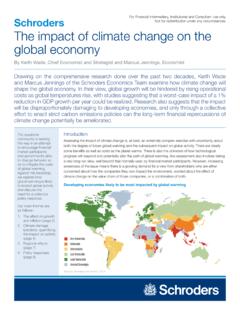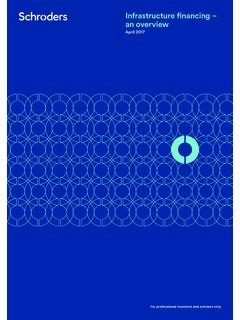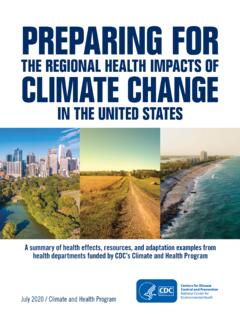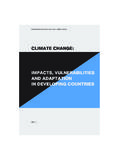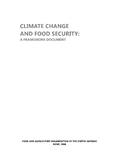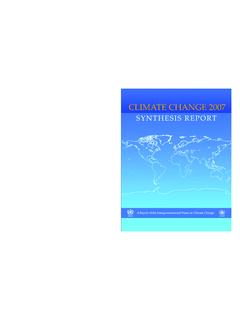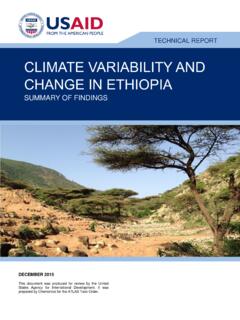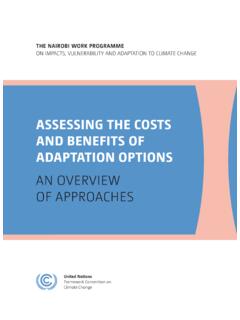Transcription of The impact of climate change on the global economy
1 The academic community is leading the way in an attempt to encourage fi nancial market participants and governments alike to change behavior so as to mitigate the costs of global warming. Against this backdrop, we explore how global warming is likely to impact global activity and discuss the need for a collective policy response. Our main themes are as follows:1. The effect on growth and infl ation (page 2)2. climate damage functions: quantifying the impact on activity (page 4)3. Regional effects (page 7)4. Policy responses (page 9)SchrodersIntroductionAssessing the impact of climate change is, at best, an extremely complex exercise with uncertainty about both the degree of future global warming and the subsequent impact on global activity.
2 There are clearly some benefi ts as well as costs as the planet warms. There is also the unknown of how technological progress will respond and potentially alter the path of global warming. Any assessment also involves taking a very long-run view, well beyond that normally used by fi nancial market participants. However, increasing awareness of the issue means there is a growing demand for a view from shareholders who are either concerned about how the companies they own impact the environment, worried about the effect of climate change on the value chain of those companies, or a combination of both.
3 For Financial Intermediary, Institutional and Consultant use only. Not for redistribution under any on the comprehensive research done over the past two decades, Keith Wade and Marcus Jennings of the Schroders Economics Team examine how climate change will shape the global economy . In their view, global growth will be hindered by rising operational costs as global temperatures rise, with studies suggesting that a worst-case impact of a 1% reduction in GDP growth per year could be realized. Research also suggests that the impact will be disproportionately damaging to developing economies, and only through a collective effort to enact strict carbon emissions policies can the long-term fi nancial repercussions of climate change potentially be impact of climate change on the The impact of climate change on the global economyglobal economyBy Keith Wade, Chief Economist and Strategist and Marcus Jennings.
4 EconomistDeveloping economies likely to be most impacted by global warmingVery VulnerableVulnerableIntermediateLess VulnerableLeast VulnerableUnrated SovereignsSource: Standard and Poor s, 2014 Schroders The impact of climate change on the global economy21. The effect on growth and infl ationDespite there being winners and losers, increasing temperatures will be negative for global activity overallThe overall aggregate effect of climate change on economic growth will most likely be negative in the long run. Although there will be winners and losers from climate change at varying levels of warming, the impact of rising temperatures will be widespread, in part due to the fi nancial, political and economic integration of the world s economies.
5 global warming will primarily infl uence economic growth through damage to property and infrastructure, lost productivity, mass migration and security threats. The balance between winners and losers turns increasingly negative as temperatures warming is expected to increase the frequency and severity of extreme weather events, bringing with it property and infrastructure loss. The likes of Hurricane Sandy, which fl ooded much of New York in 2012, are prime examples of the economic damage such extreme weather events can cause.
6 Rising sea levels will also likely harm economic output as businesses become impaired and people suffer damage to their homes. While the initial economic response to recover this damage may be positive for GDP (when it is possible to do so), once it is recognized that such events are a permanent feature of the environment, the world economy faces an extreme challenge. Many will fi nd that it is not worth replacing capital stock unless measures can be taken to prevent future damage, or there is an opportunity to move the business to safer ground.
7 At best, this could involve a short period of disruption as businesses relocate; at worst, a permanent loss of capital stock and output. As the temperatures continue to climb, the damage will become increasingly a production function (Figure 1), we can demonstrate the likely effect climate change will have on output. If we assume less capital stock is available due to the damage infl icted from climate change , we would see a fall in the productive capacity of the world economy . This would translate into a downward shift in the world production function as each unit of labor produces less output.
8 Lower labor productivity may not just occur due to a lower level of capital stock, however. Higher global temperatures may affect food security, promote the spread of infectious diseases and impair those working outdoors. Such factors are likely to cause greater incapacity and social unrest and as a result will reduce both the effectiveness (productivity) and the amount of labor available to produce output. This effect can also be expressed as a supply shock through a supply and demand framework (Figure 2). global warming is likely to contract supply at any given price and result in a backward shift of the supply curve (from S1 to S2).
9 As the diagram demonstrates, this will result in a lower level of output (Y2) and, as we discuss in the next section, a higher price (P2).Source: Schroders Economics Team. For illustrative purposes 1: global production functionFigure 2: Supply and demand effectsPriceOutputDP1Y1S1Y2S2P2 OutputLaborLY1Y=f (L, K1)Y=f (L, K2)Y2 Schroders The impact of climate change on the global economy3 There is also an opportunity cost to be considered. The above analysis is based on a ceteris paribus1 argument whereby the world s population is seen not to respond to climate change .
10 It is probable that over time, preventative measures such as fl ood defenses are put in place in order to avoid the costs of climate change . While this may reduce the long-term economic consequences, there is likely to be a short-term economic cost to this action as resources are directed away from more productive uses. According to Mendelsohn (2013), the biggest threat climate change poses to economic growth is from immediate, aggressive and ineffi cient mitigation policies. The process of adaptation and mitigation will require a temporary economic transition from consumption to investment, with the argument being that the transitional costs are small relative to the cost of inaction.
